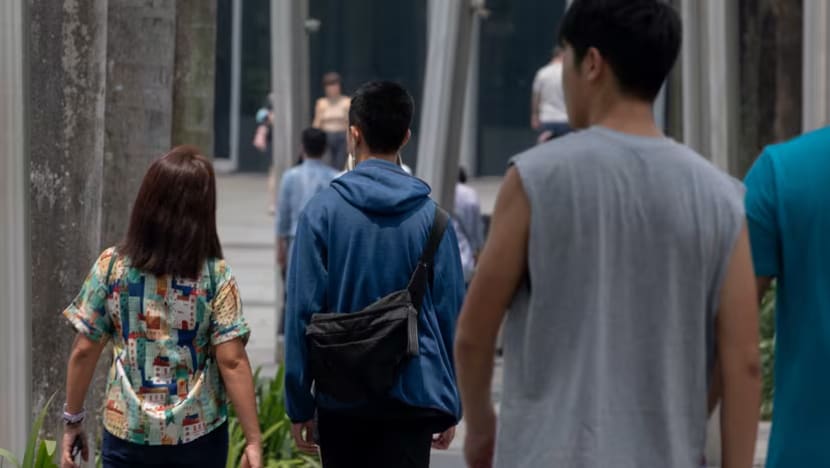Singapore 'redoubling efforts' to better understand mental health issues youths face: DPM Wong
Singapore 'redoubling efforts' to better understand mental health issues youths face: DPM Wong

- Singapore is experiencing a rise in mental health issues among youths, said Deputy Prime Minister Lawrence Wong
- To address these issues, Singapore is working with researchers worldwide to better understand the root causes and tackle them
- Mr Wong was speaking on a parliamentary motion on advancing mental health
- Mr Wong also called for a change in mindset regarding success, urging Singaporeans to avoid being caught in a "rat race" and to prioritise mental well-being
SINGAPORE: Singapore is seeing a surge in mental health issues among youths, and the government is taking the matter "very seriously” and "redoubling efforts" to understand this phenomenona, said Deputy Prime Minister Lawrence Wong.
To better tackle the root causes of poorer mental health among youths, Singapore is working with researchers around the world to study the causes of the "worrying trend", DPM Wong said in parliament on Wednesday (Feb 7).
Rising as the first political office holder to speak on a parliamentary motion on advancing mental health, he noted that this trend of poorer mental health is also seen in other countries and researchers believe that this is linked to two issues.
The first is heavy social media usage, given:
- The constant pressure to present a positive image online
- The fear of missing out
- Algorithms that flood news feeds with stories that are designed to spark outrage
- Issues of cyberbullying
Furthermore, with more time spent online, users are likely to end up being sleep-deprived, doing less physical exercise and having fewer real live interactions, all of which, he said, are important for healthy brain development.
The second issue relates to what happens offline in real life.
Mr Wong said: “Other researchers think that it’s not just about more online safeguards, and that we also need to loosen up in the real world and give our children more space for free play and autonomy.”
“Because when children have less room to play and explore, or to interact and build social skills at an early age, they are also less likely to grow up with a sense of independence and confidence to take charge of their own lives,” he said.
Mr Wong stressed that more work needs to be done to better understand what has changed in recent years with regard to youths' mental health.
“It’s an area that requires further research and study — to identify the key causal factors, and the interplay between these factors, so that we can design and put in place the appropriate interventions to help our youths.”
He noted that while teenage angst has always been part of the growing up process, this has changed around the world starting in the early 2010s, with youths today expressing more concerns about their mental health than previous cohorts.
More countries have reported increases in suicidal ideation, as well as mental health conditions such as anxiety, and depression amongst their youths.
And last year, the United States Surgeon General called the increasing mental health needs of US youth the "defining public health crisis of our time".
“Even the Nordic countries, consistently ranking high in global happiness and well-being surveys, are seeing rises in youth anxiety, depression and a variety of mental illnesses,” said Mr Wong.
However, Mr Wong noted that the phenomenon seen here is not at the same high levels as in some countries, where mental health issues are conflated with other problems such as drug abuse, homelessness, and street violence.
“But it is nevertheless a worrying trend, and we are taking this very seriously,” he said.
“In our strategy, we are redoubling our efforts to better understand the issues that young people face.”
CHANGE IN MINDSET REQUIRED
Mr Wong also told the House that the government would make "significant moves" to improve Singaporeans' mental health and well-being, as he called for a more inclusive "Singapore Dream" and a mindset change on what constitutes success.
He announced a raft of measures, including:
- Increasing capacity at the Institute of Mental Health (IMH) and the redeveloped Alexandra Hospital
- Ramping up the number of public sector psychiatrists and psychologists by 30 per cent and 40 per cent respectively
- Training an additional 28,000 frontline personnel
- Introducing mental health services at all polyclinics and 900 more GP clinics
However, he said these plans would not work without a change in attitudes and mindsets, underscoring the need to destigmatise mental health conditions so people can seek help without being exposed to discrimination or “unhelpful labels”.
On redefining success, Mr Wong cautioned against being stuck in a “rat race”. While acknowledging the merits of having a culture that values hard work and excellence, he said Singapore may end up worse off as a society if people are stuck in a rat race just to get ahead of others.
“I call on all Singaporeans, who are passionate about this issue, to join us in this national movement. We have lots to do, and a full agenda ahead of us.
“The government has set out clear plans and deliverables. But the issues are complex, and we do not have all the answers. We want everyone on board, so we can learn together, and continue to fine-tune our strategies based on your feedback and ideas, and our shared experiences and insights,” he said.
This article was originally published in TODAY.



